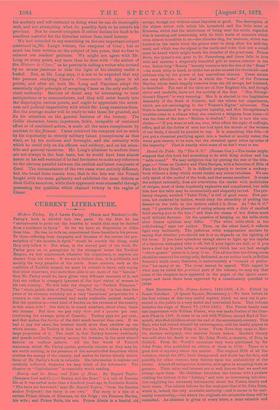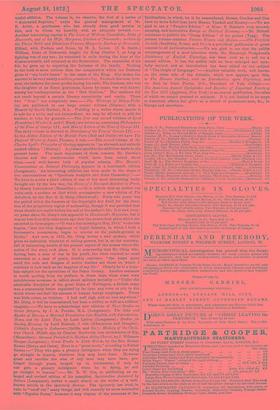Naw EDMONS. — The Paston Letters, 1122-1509, A.D. Edited by James
Gairdner. (5 Queen Square, Blooinsbury.)—We have before us the first volume of this very useful reprint, which we may say is pre- sented to the public in a very useful and convenient form. This volume includes the reign of Henry VI. (1422-1461). The Pesten family rose into importance with William Pesten, who was made Justice of the Com- mon Pleas in 1429. It came to an end with William, second Earl of Yar- mouth, who died childless about the end of the seventeenth century. This Earl, who had ruined himself by extravagance, sold his family papers to. Peter Le Neve, Norroy King of Arms. From Nave they came to Mar- tin, another antiquary, who married Neve's widow. Martin's library was sold after his death to one Mr. John Worth, a chemist, of Dias, in Norfolk. From Mr. Worth's executors they were purchased by Sir John Fenn, who published an edition of them in 1786. There is a good deal of mystery about the matter. The original MSS. of all the volumes, except the fifth, have disappeared, and doubt has for this,-and possibly for other reasons, been thrown upon the authenticity of the letters. Almost all antiquaries, however, now agree in accepting them so genuine. Their value and interest are so well known that we need not enlarge upon them. Mr. Gairduer furnishes the volume with a preface relating the history of the "Letters," and with an interesting introduc- tion supplying the necessary information about the Pesten family and their times. The edition follows for the most part that of Sir John Ferns, which is, indeed, the only available authority—and it seems to be emi- nently trustworthy,—but where the originals are accessible these will be consulted. An abstract is given of every letter, a most valuable and
naefal addition. The volume is, we observe, the first of a series of "Annotated Reprints," under the general management of Mr.
Arber, a gentleman who has already done good service in this, and to whom we heartily wish an adequate reward. — Another interesting reprint is The Lives of William Cavendishe, Duke of Newcastle, and of his Wife, Margaret, Duchess of Newcastle ; written by he Thrice Noble and Illustrious Princess Margaret, Duchess of Newcastle. Edited, with Preface and Notes, by M. A. Lower. (J. R. Smith.) William, Duke of Newcastle, fought for King Charles L as long as fighting was of any use ; he remained in exile during the time of the Commonwealth, and returned at the Restoration. The remainder of his life he gave up to repairing the fortunes of the family. Nothing in the book is more curious than the computation which the Duchess gives of "my lord's losses" in the cause of the King. She makes the amount to be very nearly a million pounds sterling. To reach this sum, how- ever, she reckons the mesne profits daring his exile. The Duchess, who was the daughter of an Essex gentleman, Lucas by name, was well known among her contemporaries as the "Mad Duchess." Her madness did not reach beyond a certain literary eccentricity and vanity. These two " lives " are completely sane.—The Writings of Henry Field- ing are published in one large octavo volume (Nimmo), with a Memoir by David Herbert, M.A. Fielding is a writer whose merits it is safe for a critic, and not inexpedient, we may be allowed to add, for readers, to take for granted.--The first and second volumes of Lord Brougham's Works (A. and 0. Black) are before us, containing Philosophers of the Time of George Ill., and Men of Letters of the Time of George III. The third volume is devoted to Statesmen of the Time of George III.— (a the Aldine Edition of the British Poets (Bell and Daldy) we have The Poetical Works of James Thomson, 2 vols.—The second volume of Sir Charles Lyell's Principles of Geology appears in "an eleventh and entirely revised edition" (Murray). A preface specifies the additions made to the present issue. The most important of them concern Mr. Darwin's theories and the controversies which have been raised about them.—A. well-known book of popular science, Mrs. Marcets Conversations on Natural Philosophy, appears in a fourteenth edition (Longmans). An interesting addition has been made in the shape of two conversations on "Spectrum Analysis and Solar Chemistry."
We have to notice a third edition of one of the most interesting books brought out by the late war, the Diary of a Besieged Resident in Paris, by Henry Labouchere (Macmillan).—It is seldom that an author can write such a preface as that which accompanies a new edition of The Subaltern, by the Rev. G. R. Gleig (Blackwood). Forty-two years was the period which the framers of the Copyright Act fixed for the dura- tion of the proprietary rights of authorship, though it was provided that these should not expire before the end of the author's life. It is now forty- six years since Mr. Gleig's tale appeared in Blackwood's Magazine, but it was no less than fifty-nine years ago that the events took place which are recorded in these pages:—" It was a fine morning in May, 1813," so the tale begins, "that the 85th Regiment of Light Infantry, in which I held a 'lieutenant's commission, began to muster on the parade-ground at Hythe." And now, in 1872, Mr. Gleig writes a new preface, which gives no indication whatever of failing powers, but is, on the contrary, lull of interesting details of the present aspect of the scenes where the action of the story took place. It is noteworthy that Mr. Gleig, who, having been a man of war in his youth, has since reached no small eminence as a man of peace, frankly confesses "the years spent amid the toils and dangers of active warfare are those on 'which I continue to look back as the happiest of my life." Clearly he is a hope- less subject for the operations of the Peace Society. Another sentence is worth quoting from his preface, in these days, when some very mislihievous nonsense is talked about military morality :—" Under the admirable discipline of the great Duke of Wellington, a British camp was a community better regulated by far than any town or city in the wort& where one-half the amount of human beings congregate. There was little crime, no violence. I had well nigh said no vice anywhere." Mr. Gleig, it will be remembered, has been a soldier, as well as a soldiers' chaplain.—We have to acknowledge new editions of Short Studies on Great Subjects, by J. A. Froude, MA. (Longmans); The Odes and Epodes of Horace, a Metrical Translation into English, with Introduction, Notes, and the Latin Text, by Lord Lytton (Longmans); Studies for Sunday Evening, by Lord Hialeah, 2 vols. (Edmonston and Douglas); Cobbetes Legacy to Labourers (Griffin and 0o.) ; History of the Chris- tian Church, Middle Age, by Charles Hardwick, late Archdeacon of Ely, (Macmillan); Sermons Preached in Hexham Abbey Church, by J. Willmore Hooper (Longman); Great Truths in Little Words, by the Rev. Father Hawes (Burns and Oates). Here is a "great truth," according to Father Rawea :—" They who gain a plenary indulgence when they are dying go straight to heaven, whatever they may have done. However great and terrible the sins of any man may have been, pro- long."' through years, heaped up in intenseness, if only he can gain a plenary indulgence when he is dying, he will go straight to heaven." — Mr. E. W. Cox, in publishing an en- larged and revised edition of his pamphlet, Spiritualism Answered by Science (Longmans), makes a smart attack on the writer of a well- known article in the Quarterly Review. The Quarterly has tried, in vain, to "snuff out" many things, and will scarcely be more successful with "Psychic Force," however it may dispose of the nonsense of the Spiritualists, in which, let it be remembered, Messrs. Crookes and Cox have no more belief than have Messrs. Tyndall and Huxley.---We are glad to see a "People's Edition" of Mons. F. Bastiat's very shrewd, amusing, and instructive Essays on Political Economy.--Mr. Michell continues to publish his "Cheap Edition" of his poems (Tegg). The present volume contains Famous Women and Heroes.--The Fairfield Orchids (Bradbury, Evans, and Co.) is a periodical publication of great interest to all horticulturists.----We are glad to see that the publie encouragement of a most laborious wbrk, Mr. Henaleigh Wedgwood's Dictionary of English Etymology, has been such as to call for a second edition. It has, the author tells us, been enlarged and care- fully revised, and an introduction has been added on the subject of "The Origin of Latiguage."—Another valuable work, well known on the other side of the Atlantic, which now appears qpon this, is The Human Intellect, with an Introduction upon Psychology and the Soul, by Noah Porter, D.D., President of Yale College.— The American Annual Cyclopedia and Register of Important Events of the Year 1871 (Appleton, New York) is an annual publication, the value of which we cannot pretend to estimate. It is not limited in its scope to American affairs, but gives us a sketch of prominent men, &c., in Europe and elsewhere.



































 Previous page
Previous page